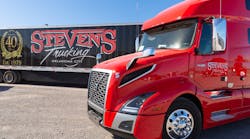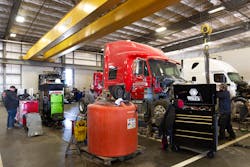Five years ago, Stevens Trucking was operating about 115 tractors, related Cole Stevens, the company’s VP of sales. Today, the El Reno, Oklahoma-based carrier has nearly tripled in size.
“With our growth has come a focus on maintaining market share, asset utilization, and profitability,” Stevens explained. “At the same time, driver satisfaction and safety have been at the forefront of our efforts.”
Two indications of the success Stevens Trucking has realized in improving safety are CSA scores related to drivers that are routinely at or below the national average and a reduction in insurance premiums because its safety scores are so good.
“We’re very bullish on how technology aids drivers, but when we’re made aware of a new solution, we don’t just get caught up in the cost,” Stevens stated. “We focus on the ROI and what it can do to protect our drivers and help our business overall. For example, reducing incidents protects drivers and the company from exposure, and it has led to insurance cost savings because our provider Nationwide has noticed.”
It was that approach that led the carrier to NoCell Technologies, a software company whose solutions address driver distraction caused by using mobile devices on the road.
See also: Partnership aims to eliminate distracted driving in trucking
“The NoCell solution addresses distracted driving by only allowing access to work-related apps while driving,” Stevens said. “But it’s not a cookie-cutter solution because its management system lets us determine the one-touch apps drivers can use within [U.S. Department of Transportation] regulations and track compliance with our policies.”
“With NoCell we’re reducing risk, liability and loss, and [we’re] maximizing productivity because drivers are focused on doing their jobs,” he added. “Since we implemented the solution three years ago, we have not had a single cell phone-involved incident while our fleet has traveled over 100 million miles annually. What also says a lot to us is that our drivers tell us it makes them realize how much it changes the way they work for the better.”
Stevens Trucking sees NoCell as a preventive technology that can be used to coach drivers. “We want them to be safer by making positive changes in their behavior,” Stevens said. “That’s the same approach we have toward the Lytx DriveCam systems we’ve installed. We only look at the video when there is a critical event to review the incident and discuss how to make sure it doesn’t happen again.”
While those efforts at Stevens Trucking, along with things like collision mitigation and lane-departure warning systems on tractors, are aimed at enhancing safety, they also help improve satisfaction and retention. Similarly, Stevens pointed to premium equipment and putting driver health and wellness at the forefront.
“Our initiatives have kept our retention rate up, even as we’ve grown substantially,” Stevens said. “Currently, only 5% of our trucks are unassigned, and our annual turnover is well below the industry average.”
“Our drivers also can expect more consistent home time because of our approach to route and lane density,” he continued. “We have a 5-to-1 trailer-to-tractor ratio because we have drop-and-hook trailer pools to give shippers flexibility and meet just-in-time delivery requirements. At the same time, it means we are very selective about creating lane corridors, so our asset utilization is as high as possible.”
Stevens Trucking operates primarily in Oklahoma, Kansas, Arkansas, Texas, and Colorado but does travel farther east, west, and north for some loads. More than 90% of its truckload service involves dedicated contract freight for a range of manufacturers, and the largest single commodity it hauls is tires.Now operating in the Stevens Trucking fleet are more than 300 late-model Freightliner and Volvo tractors as well as more than 1,500 Stoughton and Utility dry vans. The fleet is maintained in-house at company shops in Oklahoma City and Tulsa by a staff of about 50 technicians and administrative personnel. The carrier uses preferred vendors for service needs on the road, including its main fuel provider Love’s Travel Stops and some smaller independent shops.
Originally founded in 1979 with a single truck to serve the oil-field industry, only a small portion of the family-owned and -operated business is now focused on that specialized market.
“What we have continued to sell is service, and what we’ve learned is that when you’re firmly committed to your employees and your customers, you can be incredibly competitive and successful,” Stevens said.





